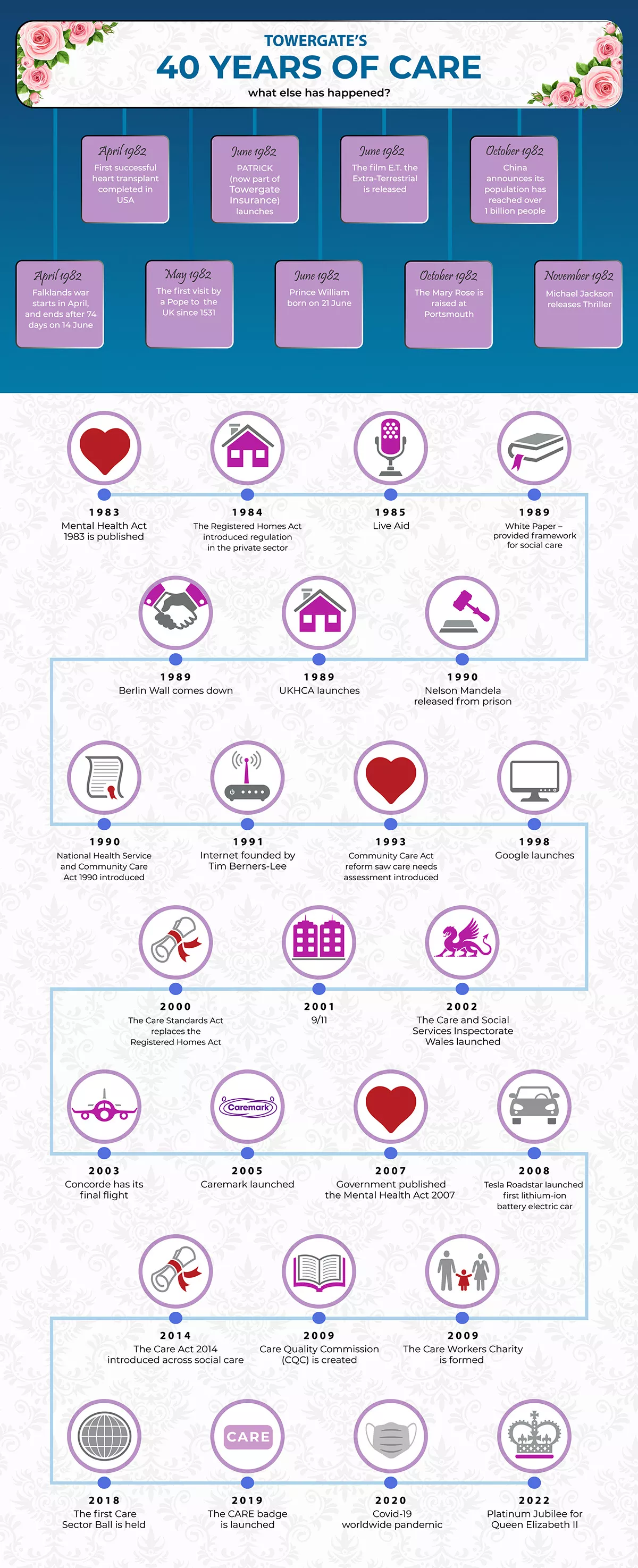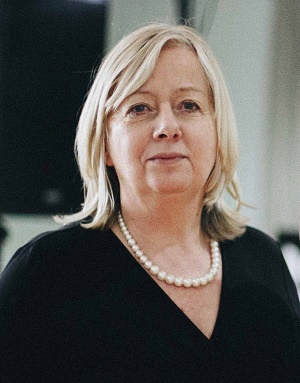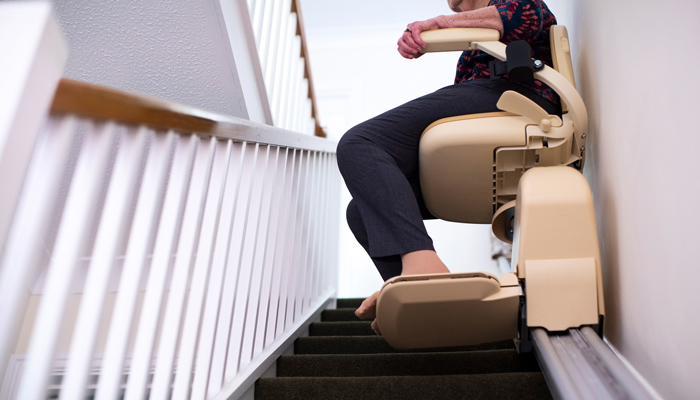In 1982, as Queen Elizabeth was celebrating 30 years on the throne and the birth of her grandchild, Prince William, the UK was in a battle with Argentina over the Falklands. This was also the year that a new insurance broker, GR Patrick sold their very first care home insurance policy and by 1983, the government had begun to adopt a new policy of care, after the 'Making a Reality of Community Care' report was published, which outlined the advantages of domiciliary care.
However, by 1986 home care was still largely unregulated and anyone wishing to provide a service to people within their home had to operate without much support, as well as a growing community requiring assistance. By 1989, the United Kingdom Home Care Association launched with just 75 members and began to assist individuals and families who required care in their own homes.
The Community Care Act 1990 was implemented on 1 April 1993, which made local authorities responsible for organising and funding support and care in the community to “enable people affected by aging or disability to live as independently as possible”. Due to the rise in home care start-ups and demand across the UK, in 1994 the UKHCA opened their official office.
As we edged closer to the millennium, the life expectancy in the UK continued to rise, meaning growing care needs escalated whether in residential homes or within their own homes. Come 2002, the Care Standards Act 2000 was introduced to regulate and ensure that care providers are competent in their duty of care, meaning more of a focus on the sector and how service users are being treated by those who care for them.
Care across the UK begins to become more of a norm, with many people beginning to access care within their homes, and with more residential homes for the elderly and those with learning disabilities and mental health issues opening, the public have more options than there has been for the past 20 years.
With more people now having access to the internet, the United Kingdom Home Care Association launched their website in 2005 offering advice and a campaign entitled ‘Fair Price for Care’ with an innovative costing model available. Around this time, GR Patrick insurance was acquired by Towergate Insurance and all clients were transferred to a new insurance broker with over 100 years of medical experience behind them. Now that there is more visibility than ever on the care sector, the Care Quality Commission launched in 2009 and became responsible for the registration, inspection and monitoring of health and adult social care providers, including independent providers, under the Health and Social Care Act 2008.
By this time at Towergate, Carolyn Baker-Mellor had joined the team who specialised in providing insurance and risk management solutions to the UK Social Care Sector and once on board, began building relationships and partnerships with a range of national care organisations, such as Care England, National Care Forum and United Kingdom Home Care Association.
Working with these partners and specialist insurers in the market to provide a bespoke service to those providing care, Towergate soon became the place to go for those looking for an insurance policy that would understand the day-to-day requirements and challenges of the sector. Each year, Carolyn and her team represent Towergate and key workers within care at the Annual Care England Parliamentary Reception where, along with other specialist speakers, Carolyn regularly speaks about a variety of topics and ideas with the people who are key stakeholders within the sector
The Care Act 2014 was introduced in the United Kingdom, with the intent to overhaul the existing legislation regarding social care. The Care Act 2014 set out the local authorities’ duties in relation to assessing people’s needs and eligibility for publicly funded care and support and included guidance on safeguarding vulnerable adults and the importance of the wellbeing of carers.
To celebrate and support the care industry, in 2015 Towergate launched their inaugural Towergate Care Awards, which up until the coronavirus pandemic, was an annual celebration of all the hard work and dedication that is often unrecognised in the sector. With categories including ‘Care Home Worker of the Year’ and ‘Outstanding Contribution to Home Care’, we received hundreds of nominations for well deserving individuals and groups across the care community.
In 2019, ‘The CARE Badge’ was introduced, after Professor Martin Green, Chief Executive of Care England, highlighted the challenges within care, and how there was no care alternative to the NHS lapel badge. The badge saw lots of news coverage when the then Health Secretary Matt Hancock began to wear it in parliament and hailed it as a badge of honour.
Just as the Care Badge started to gain traction, the world was hit by the coronavirus pandemic, with the UK’s first cases confirmed on 29 January 2020. As we now know, the pandemic was catastrophic to the care sector and the sector became embroiled into one of the biggest stories of the whole period of the virus and continues to carry on seeing challenges as well as new arrangements and legislations.
According to our care insurer, Markel who operate Markel Law Hub, they reported over 15,000 calls to their helpline during 2020 from Towergate clients, showing that many care providers needed answers to things they may never had to think about before.
Throughout the pandemic, Towergate demonstrated a deep understanding of how care homes were dealing with the pandemic, and as a result, we were not only able to provide insurance cover for care homes, but in doing so, ensured that we kept vulnerable people in their home. We joined our partners in calls with the Department of Health and Social Care to explain the issues effecting clients who were unable to get insurance and the impact this was having on the care sector.
"I want to congratulate Towergate on 40 years of outstanding commitment and service to the insurance industry, particularly to the care sector. Over those 40 years, through good times and bad, Towergate has specialised and supported care providers and ensured the product that they delivered was fit for purpose and was always developing in ways that would support the sector.
"They have always made it their mission to connect with the sector, to listen to the voices of customers and made sure that their products are fit for purpose. Care England is very proud to be associated with and work in partnership with Towergate. Congratulations again on 40 successful years – I am confident that there will be many more years of commitment and support to the care sector and they will continue to be one of the primary insurers for our services." Professor Martin Green – Care England.
Now we’re in 2022 and hopefully, with the worst of the pandemic behind us, it’s now more prevalent than ever that we need to put a focus on the care sector and look after the people that look after those who are most vulnerable. As Towergate celebrate 40 years working with care homes and domiciliary care agencies, we are taking this time to reflect on all the hard work and hours and hours that are given by those in care and want to thank everyone who provides a care service to others.
Whilst we may never know what is around the corner, Carolyn Baker-Mellor shares her hopes and expectations of the future of the care industry.
"As the increase in demand for care continues to grow, whether that be supporting people in their own homes to live fulfilled lives, or in fully supervised care settings, it’s important that we recognise that those who work in the sector play an absolutely crucial role in our society. Going forward, I hope that there is an elevated respect and recognition of those who work in the sector and that younger generations strive to be a part of this community. It’s important that future governments listen to care providers and work closely with them to respond to demands that the sector faces, financially and socially."













